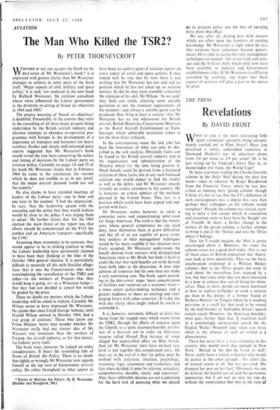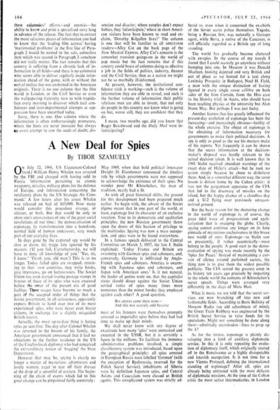Revelations
THE PRESS
By DAVID FROST
WHAT to you is the most interesting little 'quiet revolution' currently being surrepti- tiously carried out in Fleet Street? Have you perceived a subtle, unheralded reduction in Desmond Hackett's use of adjectives—down from 3.4 per noun to 2.9 per noun? Or is he just saving up for England's Glory Day in, or shame-laden exit from, the World Cup?
Or have you been reading the Charles Greville column in the Daily Mail during the past few weeks—since its takeover by Roger Beardwood from the Financial Times, where he was des- cribed as running their 'gossip column' though I think it's fair to say that the FT's definition of such extravagances was a degree less racy than perhaps their colleagues on the tabloids would recognise? Already the column has altered, start- ing to have a few scoops which in conception and execution seem to have been by 'Insight' out of Tonight. In short, a further change in the texture of the gossip column, a further attempt to bring it out of the 'thirties and into the 'fifties where it belongs.
Thus far I would imagine the Mail is pretty encouraged about it. However, the issues the column raises are a good deal wider. This is one of those areas of British journalism that Ameri- cans look at most quizzically. They see the basic anachronism enshrined in a William Hickey column—that in the 'fifties people did want to read about the marvellous lives enjoyed by a few, but that today what they are most interested in is how to achieve that sort of living for them- selves. That, in short, people are more interested in how to replace wallpaper or cook a venison pie than in the doings of a former friend of Barbara Hutton's in Tangier where he is working part-time in a small bar that used to be owned by the half-brother of Sadruddin Khan's squash rackets coach. However, the American bewilder- ment goes. further than that. It manifests itself in a continuingly unsuccessful search for the English Walter Winchell and, when you think about it, the absence of such an animal is a phenomenon.
There has never been a male columnist in this country who would merit that epitaph in New York: 'Buried in the dirt he loved so well.' Never really been a female columnist who would do justice to the other epitaph: 'She didn't die of natural causes at all. She was poisoned. She dropped her pen on her foot.' Obviously we can do without the baleful sort of acid the quotations summarise, but I am not so sure we can do without the omniscience that was at the root of
these columnists' efforts—and enemies—the ability to know and print a specialised story long in advance of the release. The fact that to extract the more salacious pieces of information you had to know that the 'leading film actress' having 'matrimonial problems' in the first line of Para- graph 2 would be named in the safe, colourless item which was second in Paragraph 3 somehow did not really matter. The fact remains that this country is suffering from a chronic lack of in- formation in all fields—and there is no columnist who seems able to deliver regularly inside infor- mation ahead of the game, with or without the sort of malice that was enshrined in the American originals. There is no one column that the film world in London, or the Civil Service or even the wallpapering fraternity turn to with trepida- tion every morning to discover which tacit con- fidences and inter-departmental attempts at sup- pression have been unearthed today.
Sorry, there is one. One column where the information is often embarrassingly premature, where the hints are never innocent but always 1133 overt attempt to sow the seeds of doubt, dis- sension and disaster, where couples don't expect babies, they 'infanticipate,' where in short Ameri- can visitors have been known to read and ex- claim, 'Dorothy , Kilgallen lives!' The column is one that will be familiar to all SPECTATOR readers—Alley Cat on the back page of the New Musical Express. Alley Cat's concern is the somewhat transient goings-on in the world of pop music but the fact remains that if this country could boast of columns doing as effective a job in the fields of politics, industry, finance and the Civil Service, then as a nation we might not be so morbidly ill-informed.
At present, however, the institutional con- fidence trick is working—such is the volume of information they are able to reveal, and such is the further volume of information their public relations men are able to invent, that not only do people in this country not know what is going on but, worse still, they are confident that they do.
I mean, two months ago, did you know that Roger Beardwood and the Daily Mail were in- fanticipating?







































 Previous page
Previous page